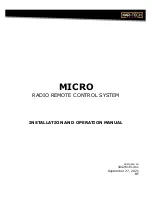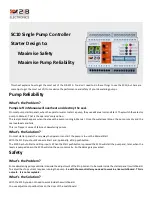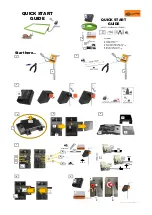
REGULATORY COMPLIANCE INFORMATION (continued)
FCC Interference Statement for Class B EVM devices
This equipment has been tested and found to comply with the limits for a Class B digital device, pursuant to part 15 of the FCC
Rules. These limits are designed to provide reasonable protection against harmful interference in a residential installation. This
equipment generates, uses and can radiate radio frequency energy and, if not installed and used in accordance with the
instructions, may cause harmful interference to radio communications. However, there is no guarantee that interference will not
occur in a particular installation. If this equipment does cause harmful interference to radio or television reception, which can be
determined by turning the equipment off and on, the user is encouraged to try to correct the interference by one or more of the
following measures:
•
Reorient or relocate the receiving antenna.
•
Increase the separation between the equipment and receiver.
•
Connect the equipment into an outlet on a circuit different from that to which the receiver is connected.
•
Consult the dealer or an experienced radio/TV technician for help.
For EVMs annotated as IC
–
INDUSTRY CANADA Compliant
This Class A or B digital apparatus complies with Canadian ICES-003.
Changes or modifications not expressly approved by the party responsible for compliance could void the user
’
s authority to operate
the equipment.
Concerning EVMs including radio transmitters
This device complies with Industry Canada licence-exempt RSS standard(s). Operation is subject to the following two conditions:
(1) this device may not cause interference, and (2) this device must accept any interference, including interference that may cause
undesired operation of the device.
Concerning EVMs including detachable antennas
Under Industry Canada regulations, this radio transmitter may only operate using an antenna of a type and maximum (or lesser)
gain approved for the transmitter by Industry Canada. To reduce potential radio interference to other users, the antenna type and
its gain should be so chosen that the equivalent isotropically radiated power (e.i.r.p.) is not more than that necessary for successful
communication.
This radio transmitter has been approved by Industry Canada to operate with the antenna types listed in the user guide with the
maximum permissible gain and required antenna impedance for each antenna type indicated. Antenna types not included in this
list, having a gain greater than the maximum gain indicated for that type, are strictly prohibited for use with this device.
Cet appareil num
é
rique de la classe A ou B est conforme
à
la norme NMB-003 du Canada.
Les changements ou les modifications pas express
é
ment approuv
é
s par la partie responsable de la conformit
é
ont pu vider
l
’
autorit
é
de l
'
utilisateur pour actionner l
'é
quipement.
Concernant les EVMs avec appareils radio
Le pr
é
sent appareil est conforme aux CNR d
'
Industrie Canada applicables aux appareils radio exempts de licence. L
'
exploitation
est autoris
é
e aux deux conditions suivantes : (1) l
'
appareil ne doit pas produire de brouillage, et (2) l
'
utilisateur de l
'
appareil doit
accepter tout brouillage radio
é
lectrique subi, m
ê
me si le brouillage est susceptible d
'
en compromettre le fonctionnement.
Concernant les EVMs avec antennes d
é
tachables
Conform
é
ment
à
la r
é
glementation d
'
Industrie Canada, le pr
é
sent
é
metteur radio peut fonctionner avec une antenne d
'
un type et
d
'
un gain maximal (ou inf
é
rieur) approuv
é
pour l
'é
metteur par Industrie Canada. Dans le but de r
é
duire les risques de brouillage
radio
é
lectrique
à
l
'
intention des autres utilisateurs, il faut choisir le type d
'
antenne et son gain de sorte que la puissance isotrope
rayonn
é
e
é
quivalente (p.i.r.e.) ne d
é
passe pas l
'
intensit
é
n
é
cessaire
à
l
'é
tablissement d
'
une communication satisfaisante.
Le pr
é
sent
é
metteur radio a
é
t
é
approuv
é
par Industrie Canada pour fonctionner avec les types d
'
antenne
é
num
é
r
é
s dans le
manuel d
’
usage et ayant un gain admissible maximal et l
'
imp
é
dance requise pour chaque type d
'
antenne. Les types d
'
antenne non
inclus dans cette liste, ou dont le gain est sup
é
rieur au gain maximal indiqu
é
, sont strictement interdits pour l
'
exploitation de
l
'é
metteur.









































